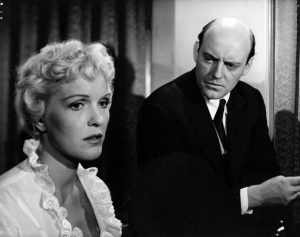Classic Cinema: Dreams
Directed by Ingmar Bergman
Starring Susanne Frank, Harriet Andersson, Ulf Palme
Reviewed by Michael Dalton
Ingmar Bergman’s obsession with women, their psyches and the bonds they share takes beautiful form in his 1955 film Dreams. It’s never been as lauded as say, Cries and Whispers or Persona (a film it prefigures), but it resonates as powerfully. It’s a beautifully framed film, Eva Dahlbeck delivers a spellbinding performance, and despite its remarkably short running time (barely 90 minutes) it’s as effective as anything else in the director’s canon.
Set in Stockholm, Dahlbeck is Susanne Frank, a fashion director and Harriet Andersson is Doris, her muse. The film opens with a fashion shoot interrupted by Palle (Sven Lindberg), the model’s boyfriend arriving to tell her their relationship is over. Her teary reaction brings the day to an end with Doris and Susanne travelling to Gothenburg soon after to complete the layout. It is there Susanne’s great love Henrik (Ulf Palme) lives with his wife (Inga Landgre). After initial resistance on his part, he agrees to meet with Susanne in her hotel room. Meanwhile Doris meets the lonely, well-to-do Otto (Gunnar Bjornstrand), an older man who is enchanted by her beauty and buys her an expensive dress and jewellery.
Irony has always played an important role in Bergman’s films and in Dreams, it pervades the scenery. During the trysts both women enjoy, they’re interrupted by spiteful women who undermine the intimacy. Otto’s petulant daughter arrives to demand money while Henrik and Susanne’s afterglow is torn asunder by the appearance of Henrik’s wife. Both heroines are left feeling cheapened by the interlopers and while it feels like reluctance on Bergman’s part, liberation follows. Neither woman fully receives what she seeks but priorities are reset and inner strength restored. Dreams is only a small piece but Bergman’s depth and emotional instincts were as sharp as ever.
There are always long shadows in Bergman’s films with the splintering of emotions at the centre. While it might be the turning point here, the film seeks to examine that quality in all of us, that burning need to love and desire and receive it in return. There are critics who only consider his more famous films to be the ones worth discussing yet Dreams has the same virtues and strengths as The Seventh Seal and Wild Strawberries. Parallels abound in the visuals particularly with the many studies of Dahlbeck’s face, first looking out the train window at the rain splashing against the pane and then, identically, in her hotel room awaiting Henrik’s arrival. It’s these moments, seemingly incidental, that Bergman uses to establish state of mind. Consider the scene where Doris hastily retreats from Otto’s home. She dashes towards the camera surrounded by trees bathed in sunshine. It’s as if she’s been reborn.
Bergman always considered Dreams an honourable failure but time has enriched it. The years seem to have added layers. It ends as it began yet it doesn’t feel as neat as Bergman later said it was. It feels perfect.




